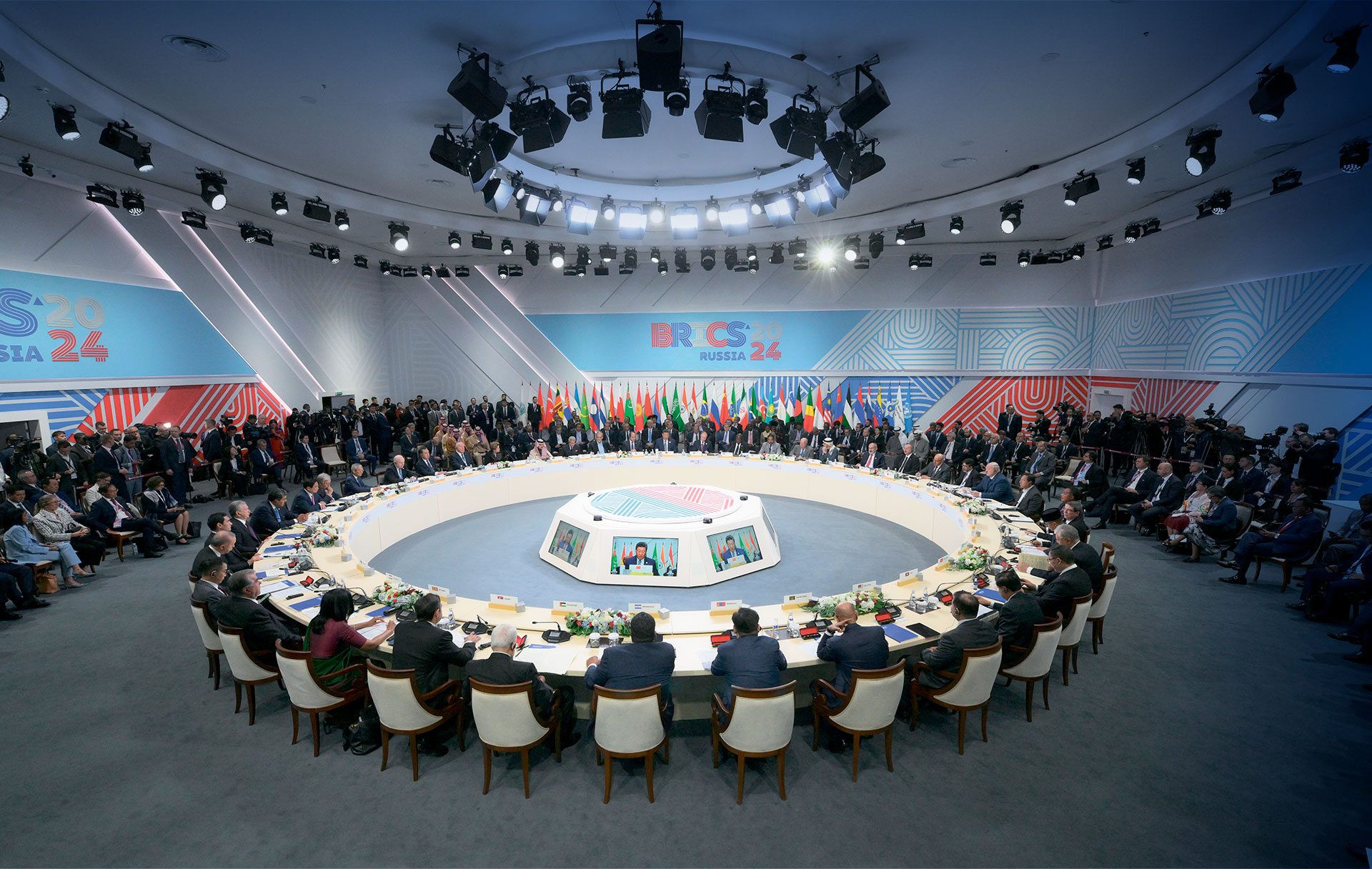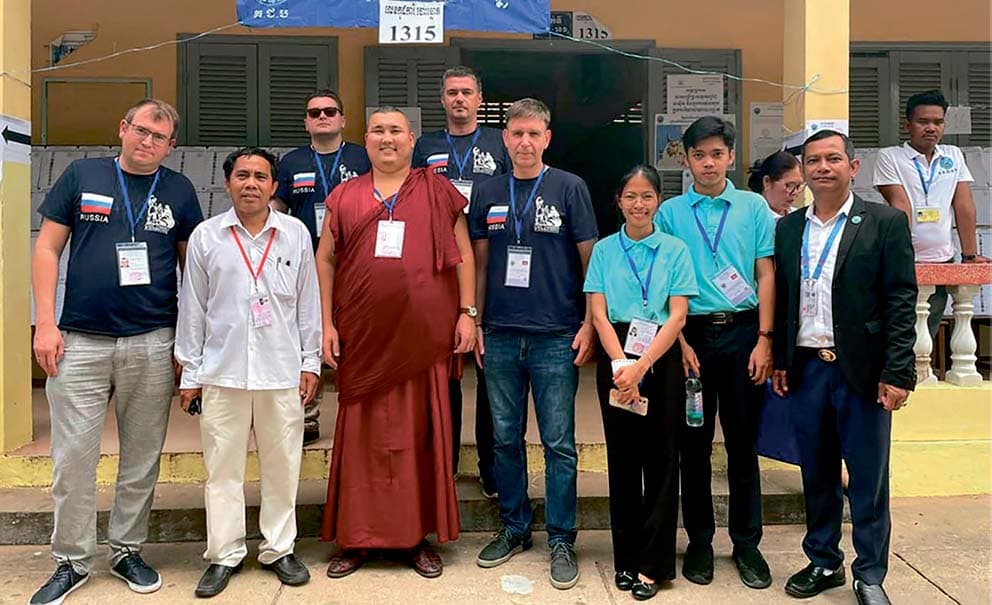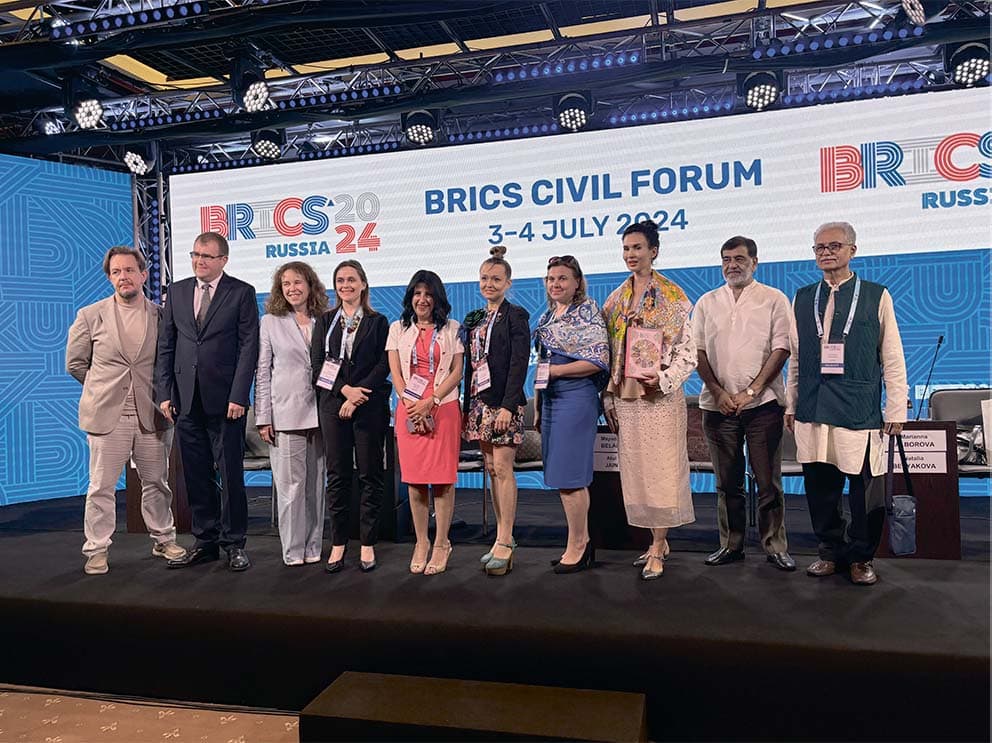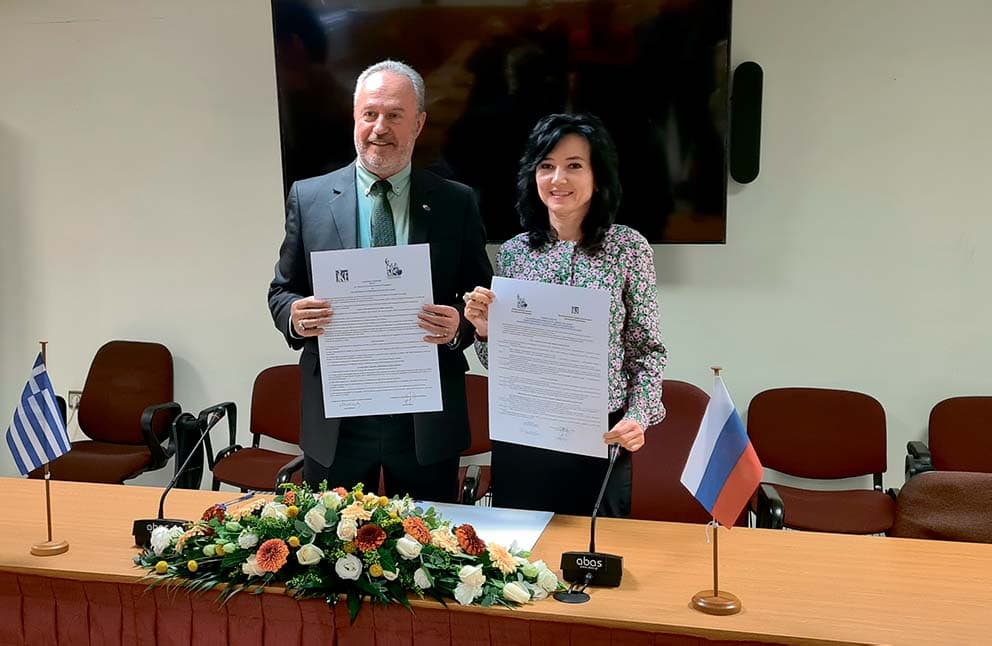6. Public Diplomacy

XVI BRICS Summit. Plenary Session of the XVI BRICS Summit in the “Outreach” / “BRICS Plus” format. October 24, 2024. Alexey Danichev / Photo Hosting Agency brics-russia2024.ru
In 2024, the international relations system continued to undergo a period of transformation. Amid their systemic crisis, a new dimension of principles for international cooperation began to take shape, based on considerations of national interests, multipolarity, and equitable approaches to interstate interaction. The commitment of the world majority of countries to multilateralism and adherence to international law, including the goals and principles enshrined in the Charter of the United Nations, as well as the establishment of intergovernmental relations on a democratic, transparent, and equitable basis, have been solidified as the foundation for the formation of a future global polycentric order.
Enhancing interaction with the countries of the Global South
In light of current events, Russia has proposed a fundamentally different vision of the world order’s architecture compared to the positions of other players on the international stage. This vision not only involves joint efforts to build a new international security system within the framework of today’s existing institutions and negotiation platforms of the multipolar world (such as BRICS, SCO, EAEU, and others) but also emphasizes establishing a new balance of power based on traditional values and coordinating the efforts of the world majority in a post-globalism environment. Throughout 2024, a coordinated policy was implemented to promote the Russian cultural code — norms and principles based on the decree issued by the President of the Russian Federation on November 9, 2022, No. 809, “On Approval of the Fundamentals of State Policy for the Preservation and Strengthening of Traditional Russian Spiritual and Moral Values.”
The formation of a polycentric international architecture, especially highlighted by the expansion of BRICS during Russia’s chairmanship, played a positive role in establishing and strengthening social dialog.
The outlines of the emerging multipolar world order were reflected in the activities of representatives of the Russian nonprofit sector on the international stage. Interaction with partner institutions from the Global South and the East intensified, and a course was set for expanding the scope of cooperation with the Latin American continent, partners from the SCO countries, and the aforementioned BRICS organization. Throughout the year, representatives of Russian civil society—domestic NPOs and members of the Civic Chamber of the Russian Federation—participated in a number of activities aimed at strengthening Russia’s positions in the world, including promoting the Russian language and culture. They supported efforts to diversify cultural, humanitarian, scientific, and youth exchanges with countries of the Global South.
Against the backdrop of changes in the global world architecture, the role of public diplomacy continued to grow.
In the context of increasingly unconstructive and deadlocked policies of unfriendly governments towards Russia, alongside the persistent efforts of Western political elites and media to create a negative image of our country and demonize Russia, several public institutions in foreign countries have generally maintained, and often intensified, their contacts with Russian partners.
An important focus for representatives of the third sector, in general, and the Civic Chamber of the Russian Federation, in particular, has been systematic efforts to provide truthful information to representatives of the nonprofit sector and citizens of foreign countries about the reasons, progress, and objectives of the special military operation of the Russian Federation in Ukraine. With the assistance of Russian diplomatic missions abroad, relevant informational and explanatory work has been carried out.
A significant role as an instrument of soft power was played by the World Festival of Youth held in March 2024 in Sochi. Organized in accordance with a Decree of President Vladimir Putin for the purpose of developing international youth cooperation, the large-scale event brought together over 20,000 youth leaders from 190 countries. It elevated the dialog on youth policy implementation to a qualitatively new level while showcasing Russia’s openness, hospitality, and cultural and national diversity to future generations of world leaders. The festival served as a platform for consolidating views and positions on a wide array of issues, and it demonstrated the youth’s commitment to jointly building a fair multipolar world based on cooperation and a balance of interests, rather than on the concept of hegemony of a Western unipolar world.
Vladimir Putin’s decisive victory in the March 2024 presidential elections in Russia demonstrated to the international community the unconditional support of the Russian leader and his foreign policy course by the country’s population. The openness and transparency of the electoral processes in Russia were clearly confirmed through the organization of independent international election observation.
Election observation
International election observers and experts at the presidential elections of the Russian Federation
As one of the key institutions of public oversight, the Civic Chamber is actively involved in observing electoral processes both within Russia and abroad. In cooperation with the Central Election Commission, the Ministry of Foreign Affairs of the Russian Federation, the State Duma, and the Council of Federation of the Federal Assembly of the Russian Federation, the Civic Chamber organizes international election observation of national electoral procedures, inviting experts from around the world.
During the observation of the 2024 presidential elections in Russia, 1,115 observers and experts from 129 countries took part, underscoring the significant interest of the international community in the Russian electoral system.
Among them, the Civic Chamber of the Russian Federation invited 185 observers from 58 countries. The invited experts included specialists in electoral processes, representing both national and international organizations engaged in election observation.
One of the key elements of the work of the Civic Chamber of the Russian Federation was the Monitoring Center for citizen election observation, which operated from March 14 to 18. Visiting the center was part of the program for all international observers working in Moscow. From March 15 to 17, the Monitoring Center hosted over 200 representatives from more than 50 countries.126 This center provided a clear demonstration to international observers of the quality of the electoral process organization in Russia, showcasing its reliability, transparency, and high level of digitalization, serving as a significant example for foreign colleagues.
International election observation
In 2024, the Civic Chamber of the Russian Federation continued its active involvement in the field of international election observation, aimed at strengthening international cooperation, promoting Russian standards in electoral monitoring, and studying electoral practices in various countries around the world.
Traditionally, a wide range of members of the Civic Chamber of the Russian Federation participate in observation missions, predominantly those with experience in electoral monitoring or organization of elections.
In 2024, observation missions of the Civic Chamber were accredited at general elections in Pakistan, South Africa, Mexico, Uruguay, and Namibia, and presidential elections in Venezuela and Sri Lanka. Strengthening relations with foreign NPOs and CSOs specializing in election observation allows for the organization of joint international missions, as was the case in the Uruguayan elections, where a member of the Civic Chamber was invited as an expert to a joint observation mission by the Electoral and Political Institutional Studies Center of the Faculty of Legal and Social Sciences of the National University of La Plata (Argentina) and the South American University Institute of Uruguay (ISUR).
The observation missions of the Civic Chamber abroad serve as an effective tool of Russian public diplomacy.
Within the framework of observation missions, members of the Civic Chamber delegations meet with representatives of local bodies responsible for organizing elections, political parties, and public movements. During these meetings, they discuss issues related to ensuring electoral transparency, security measures, as well as the specific features of electoral systems. They study technical and technological mechanisms for information transmission and vote counting, as well as approaches to the digitalization of the electoral process.
Observers note active political competition, the loss of positions by parties that have dominated politics for decades (like in South Africa), the coming to power of the opposition (as in Sri Lanka), and even attempts to organize a “color revolution” (such as in Venezuela). Despite experiencing a rather turbulent situation in the country’s capital, Caracas, which the authorities managed to calm, the Civic Chamber’s observation mission did not record any major violations and issued a communiqué stating that the elections complied with local laws.

Members of the Civic Chamber of the Russian Federation’s observation mission at a polling station. Elections of the National Assembly of the Kingdom of Cambodia. July 23, 2023. Press Service of the Civic Chamber of the Russian Federation.
The current geopolitical realities increasingly demonstrate the significance and relevance of the work being carried out, which objectively contributes to the expansion of Russian humanitarian influence worldwide. The observation missions of the Civic Chamber of the Russian Federation allow for the activation of dialog with partner structures, establishing lively dialog with political forces and key stakeholders in the electoral process in the countries of deployment.
Since 2022, the work of the Civic Chamber’s observation missions has been documented in special reports summarizing the results of election monitoring. The report analyzes various approaches practiced worldwide both in the organization of the electoral process and electoral legislation.
The special report, also translated into English, serves as a kind of business card in meetings with foreign partners and representatives of international election observation missions, enhancing the effectiveness of establishing connections with national, regional, interstate, and international organizations specializing in election issues and electoral monitoring, and demonstrating the status of the Civic Chamber as a center of electoral expertise. This comparative analysis is unique in the Russian-language journalistic and academic literature.
The report for the year 2023 included reviews of the results of the Civic Chamber’s missions in the Republic of Guinea-Bissau, the Kingdom of Cambodia, the Republic of Zimbabwe, the Kingdom of Eswatini, and the Argentine Republic. The foreword to the report was authored by Valentina Matvienko, Chairperson of the Council of Federation of the Federal Assembly of the Russian Federation, Chairperson of the Council of the Interparliamentary Assembly of the CIS Member Nations, and Pavel Andreev, a member of the Central Election Commission of the Russian Federation.
Formats of cultural and humanitarian cooperation
In its current composition, the Civic Chamber has resumed the work of the Coordination Council for International Cooperation. Established in 2020, it aims to unite the efforts of civil society representatives on international issues and become a platform for open exchange of opinions on key questions of Russian public diplomacy.
BRICS Civil Forum
With the participation of the Civic Chamber, the IX BRICS Civil Forum was held in Moscow in July 2024. It brought together over 450 civil society representatives from more than 20 countries, including both current and potential members of the interstate group. Over two days, participants from the member-states discussed the goals and principles of fair development and an equitable world order, sovereign economic and financial development, and issues of education, healthcare, ethics of new technologies, human wellbeing, and more. The discussions resulted in proposals on the priorities of the BRICS agenda, as well as several civil initiatives within this agenda.
A member of the Civic Chamber of Russia moderated the session “Cultural Bridges of BRICS Countries.” Among the consolidated proposals developed by the session participants was the idea of unifying symbols, such as the creation of a BRICS anthem and the implementation of the “National Cultural Seasons” project, which will allow BRICS countries to regularly represent each other in partner countries of the union. Other suggestions included the unification of standards for the exchange of mobile cultural objects between BRICS countries and more. The forum’s outcomes led to recommendations developed by civil society, which were summarized in the declaration of the XVI BRICS Summit held from October 22–24 in Kazan.

Members of the Civic Chamber of Russia with representatives of foreign delegations at the session “Cultural Bridges of BRICS Countries,” held within the framework of the “Culture, Sports, Tourism” Working Group of the BRICS Civil Forum. July 4, 2024. Press Service of the Civic Chamber of the Russian Federation
“Cancel Culture” Report
In 2024, work continued on the doctrinal understanding of the contemporary Western ideology known as cancel culture, conducted by a member of the Civic Chamber of Russia for two years.
On September 14, 2023, the report ‘Modern Russophobia: “Cancel Culture” as a Totalitarian Cult’ was presented at the site of the Civic Chamber of the Russian Federation. Maria Zakharova from the Russian Foreign Ministry participated in the presentation.
The report thoroughly examined the reasons and prerequisites for the emergence of the “Сancel Сulture” phenomenon and Russophobia as one of its specific manifestations, as well as the “new ethics”—a new iteration of the ideology of Western imperialism, which justifies the West’s right to interfere in the internal affairs of other states from a position of moral superiority.
Agents of the “new ethics” indoctrinate the youth and humanitarian elites of non-Western societies, imposing on them a holistic Western-centric view of current processes. Under the ideological guise, through globalization mechanisms, the West conducts a neo-colonial policy of resource extraction and maintaining the economic and political status quo. The West applies “cancel culture” to those who disagree with the existing dynamics—a set of measures aimed at erasing historical heritage and prominent figures from the global cultural and humanitarian space, as well as excluding states from international political-economic institutions and imposing restrictions on business relations with them. Regarding Russia, the West increasingly attempts to reconsider the outcomes of the Great Patriotic War.
As a result of the discussion of the report by the expert community within the Civic Chamber of the Russian Federation, an expanded, refined, and supplemented edition of the report was prepared. It was presented at the Civic Chamber on May 21, 2024, and translated into English for dissemination through the Russian foreign missions of the Ministry of Foreign Affairs. The final version of the report was also presented to the Minister of Foreign Affairs of the Russian Federation, Sergey Lavrov, and participants of the BRICS Civil Forum.
Project on the development of public diplomacy with Latin American countries
In an era of global uncertainty, Latin America is becoming one of the vital vectors of our country’s international interaction, occupying a special place in Russia’s foreign relations as a friendly region open to mutually beneficial cooperation. The growing role of the Latin American region as one of the centers of new multipolarity fully aligns with Russian interests. Multilateral and constructive interaction between Russia and Latin American partners unveils new facets, success stories, and joint projects and initiatives initiated at the start of the new composition of the Civic Chamber since June 2023 and realized in 2024.
To strengthen the traditions of friendship and development of relations between the people of the Russian Federation and the Republic of Cuba, supporting cooperation in healthcare, culture, education, history, and other fields, the Civic Chamber of the Russian Federation and the Cuban Institute of Friendship with the Peoples (ICAP), represented by its president, Hero of Cuba Fernando González Llort, signed a memorandum of understanding and cooperation.
Contacts have been strengthened with Cuba’s largest public organization, the Committee for the Defense of the Revolution, led by Hero of Cuba Gerardo Hernández Nordelo. Over the year, a pilot project for establishing cultural dialog through organizing photo exhibitions by the Civic Chamber was successfully implemented. In particular, the “Wives of Heroes” exhibition was displayed for several months in various regions of the Republic of Cuba, informing the Cuban public about the humanitarian topics in the special military operation. Another exhibition showcasing the modern development of our country under sanctions—”Russia’s Successes and Achievements”—was also presented to the residents of six other Latin American countries besides Cuba.
In August 2024, with support from the Russian House in Mexico, the Civic Chamber’s exhibition “Children of Russia,” dedicated to the ethnic and cultural diversity of our country, was presented at the Cultural Festival of Cities, whose sites are included in the UNESCO World Heritage List, in Durango, Mexico.
An important format of public diplomacy in general and the Latin American project of the Civic Chamber in particular has become meetings in university auditoriums. Meetings with students studying the Russian language at the University of Havana and responses to their challenging questions, presentations before those interested in learning new information about Russia in three universities in Mexico City and the states of Mexico and Puebla, and organizing competitions about our country have provided an opportunity to assess the high demand for studying Russia and the desire to obtain information from reliable sources.
A vivid testament to this thesis is the immediate response to the Civic Chamber’s initiative to hold an international conference on preserving historical truth and cultural heritage from the leading university in Latin America — the University of São Paulo. In November 2024, a delegation from the Civic Chamber is invited to speak in various university auditoriums on this topic, which is very relevant, including for Brazil. Additionally, as part of the conference, a photo exhibition dedicated to the 80th anniversary of Victory will be held.
Cooperation at bilateral and multilateral levels
International association of economic and social councils and similar institutions
The Civic Chamber of the Russian Federation is actively engaged on international platforms, representing Russian civil society and promoting its interests on a global scale. Participation in international forums and conferences allows the Chamber to effectively establish connections with partner institutions, exchange views on key issues of the global agenda. The work on international platforms covers important areas such as the protection of human rights, support for civic initiatives, and the development of public institutions.
In 2024, efforts continued in line with the International Association of Economic and Social Councils and Similar Institutions (AICESIS). After handing over the chairmanship to the Economic and Social Council of Curaçao, the Civic Chamber retained its status as a member of the governing Board of the Association. In addition to participating in the meetings of AICESIS’s governing bodies, members of the Civic Chamber take part in drafting common documents of the Association to present on major international platforms.
In November 2024, a delegation from the Civic Chamber of the Russian Federation participated in the annual meeting of the AICESIS General Assembly in Shanghai, China. On the sidelines of the meeting of the Association’s highest governing body, Russian civil society representatives held a series of meetings with representatives of the economic and social councils of AICESIS member countries, including Chinese partners, thereby strengthening the foundations of bilateral strategic interaction.
During these meetings, prospects for the development of bilateral cooperation and joint work within the framework of established partnership roadmaps in the field of social and economic development, sustainable development, and ecology were discussed. Special attention was paid to exchanging experiences in the field of social programs and the development of national civil society structures.
Bilateral interaction
The Civic Chamber is establishing cooperation with civil society organizations in countries where there are no equivalents to the Civic Chamber in the form of economic and social councils, or where these councils are not members of AICESIS. During the year, meetings were held with representatives of the Mexican movement “Antorcha”, the National Economic Development and Labor Council of South Africa, and the National Commission of Social Organizations of Uruguay.
The round table “Ways and Opportunities to Preserve and Strengthen Trust Between Public Representatives and NPOs of Russia and Germany in Modern Conditions,” held in October 2024 at the Civic Chamber of the Russian Federation at the initiative of the International Public Fund “Russian Peace Foundation” and the Society “Russia — Germany,” confirmed the commitment of constructively minded organizations from unfriendly states to build horizontal connections with Russian civil society institutions. The event provided an opportunity to discuss the establishment of connections between civil society representatives from Russia and Germany, the implementation of joint sociohumanitarian projects, as well as the search for new areas and formats of cooperation between Russian and German NPOs.
The visit of the Civic Chamber delegation to Greece in December 2024 and the signing of a memorandum with the Economic and Social Council of Greece once again refutes the attempt by Western political elites to isolate Russia and highlights the public’s disagreement with the course set by these elites.

Signing of the Memorandum of Cooperation and Interaction between the Civic Chamber of the Russian Federation and the Economic and Social Council of the Hellenic Republic. Athens (Greece), December 1, 2024. Press Service of the Civic Chamber of the Russian Federation
The steady development of bilateral contacts continued with a significant visit by the delegation of the Civic Chamber of the Russian Federation to Vietnam in September 2024, during which a memorandum was renewed for another five-year term between the Civic Chamber of the Russian Federation and the Central Committee of the Vietnam Fatherland Front.
The “Community” Forum has become a traditional meeting place for representatives of Russian NPOs and those from post-Soviet countries. The participation of the Civil Alliance of Kazakhstan delegation has become regular at the forum, and, for the first time, representatives of the National Association of Nongovernmental and Nonprofit Organizations of Uzbekistan attended.
The bilateral contacts developed by the Civic Chamber of the Russian Federation in 2024 contributed to strengthening international cooperation, the development of civil institutions, and the advancement of social initiatives globally.
Bilateral cooperation is one of the key areas of activity for the Civic Chamber of the Russian Federation. Establishing contacts with foreign civil society institutions allows for the exchange of experiences and best practices, which fosters cooperation on important issues of the sociopolitical agenda.
The Civic Chamber is actively building partnerships with organizations from the Global South, enhancing coordination on a range of important themes. In the context of bilateral relations, topics such as sovereignty protection, the preservation of national traditions, cultural exchange, and ensuring transparency are discussed.
- 2024: The Main Topics in Russian Civil Society
- Civil Society and the State
- Institutions of civil society as catalysts for social change
- Collaboration and cooperation between society and the state
- Consolidated efforts of public institutions to support Special Military Operation veterans
- Public participation in achieving national development goals
- 2024 — the Year of the Family
- Nonprofit organizations: a means for partnership between the state and society
- Interaction of the institution of commissioners in the Russian Federation with civil society
- Social investments as a state contribution to developing the civic potential of the nation
- Institutions of civil society as catalysts for social change
- Citizen Observation
- Public Oversight
- Citizen Appeals
- Public Diplomacy
- Conclusion. Public Initiatives for a New Era